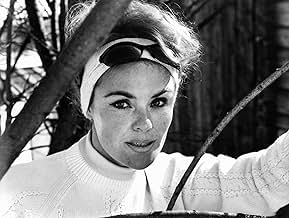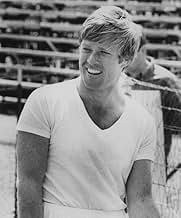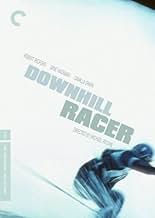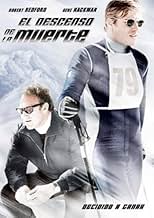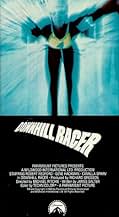IMDb-BEWERTUNG
6,3/10
5729
IHRE BEWERTUNG
Ein ehrgeiziger amerikanischer Skirennläufer ergattert einen Platz im Kader, das in Europa antritt.Ein ehrgeiziger amerikanischer Skirennläufer ergattert einen Platz im Kader, das in Europa antritt.Ein ehrgeiziger amerikanischer Skirennläufer ergattert einen Platz im Kader, das in Europa antritt.
- Regie
- Drehbuch
- Hauptbesetzung
- 1 BAFTA Award gewonnen
- 1 Gewinn & 5 Nominierungen insgesamt
Empfohlene Bewertungen
Even before it was made, this concept was a hard sell: a movie about a sport where people crouch down and go in 1 direction, downhill. Seriously, you might be more interested in a film about shepherding buffaloes ("Buffalo Boy" which I actually recommend). But wait... "Downhill Racer" is a surprisingly deep, dramatic and poignant experience that shouldn't be missed by any cinephile.
Plot summary: a guy crouches down and goes in 1 direction, downhill.
Now put that in your pocket and forget about it. The real juice of the story is, as actor & producer Robert Redford said, about crashing the common platitude that we're all told "It isn't about winning or losing; it's how you play the game."
Redford plays a character named "Chapellet" who is a very skilled, dashingly handsome, all-American athlete who happens to be a totally uneducated, self-absorbed egotist. But he becomes the darling of the slopes and the media favourite because he wins and looks good. This film was remarkably prescient back in 1969, long before the respected field of athletics was crashed by sensational bad boys like the long haired Andre Agassi who usurped Wimbledon in the 90s, or even the foul-mouthed Jimmy Conners who preceded him (foul mouthed by 80s standards which is kindergarten stuff today). My point is that beginning around 1970 there's been a fascinating split between the respectable Wheaties-box athletic archetype vs the punk who happens to be better. And if you focus on this theme, you'll see that it applies to areas far outside the ski slopes. How many of us have worked our bodies & minds to the bone for that big promotion, only to be passed over for the flashy young whippersnapper who--counfound it--is just BETTER.
Augmented with fantastic camera realism which gives a lot of scenes a documentary or reality show vibe, "Downhill Racer" gets under your skin from the opening scene where a skier gets his legs shattered, then continues to hold our attention as we eavesdrop on conversations between the ski team and the coach (brilliantly played by Gene Hackman) as well as Redford himself whose character is sort of dumb lunk who can't communicate in complete sentences and who manages to express his romantic feelings to a graceful European socialite by honking a car horn. The film is full of great moments like that, driving the point home that, no it isn't about how you play the game, it's whether you win or lose.
Plot summary: a guy crouches down and goes in 1 direction, downhill.
Now put that in your pocket and forget about it. The real juice of the story is, as actor & producer Robert Redford said, about crashing the common platitude that we're all told "It isn't about winning or losing; it's how you play the game."
Redford plays a character named "Chapellet" who is a very skilled, dashingly handsome, all-American athlete who happens to be a totally uneducated, self-absorbed egotist. But he becomes the darling of the slopes and the media favourite because he wins and looks good. This film was remarkably prescient back in 1969, long before the respected field of athletics was crashed by sensational bad boys like the long haired Andre Agassi who usurped Wimbledon in the 90s, or even the foul-mouthed Jimmy Conners who preceded him (foul mouthed by 80s standards which is kindergarten stuff today). My point is that beginning around 1970 there's been a fascinating split between the respectable Wheaties-box athletic archetype vs the punk who happens to be better. And if you focus on this theme, you'll see that it applies to areas far outside the ski slopes. How many of us have worked our bodies & minds to the bone for that big promotion, only to be passed over for the flashy young whippersnapper who--counfound it--is just BETTER.
Augmented with fantastic camera realism which gives a lot of scenes a documentary or reality show vibe, "Downhill Racer" gets under your skin from the opening scene where a skier gets his legs shattered, then continues to hold our attention as we eavesdrop on conversations between the ski team and the coach (brilliantly played by Gene Hackman) as well as Redford himself whose character is sort of dumb lunk who can't communicate in complete sentences and who manages to express his romantic feelings to a graceful European socialite by honking a car horn. The film is full of great moments like that, driving the point home that, no it isn't about how you play the game, it's whether you win or lose.
Well filmed, almost documentary style look at the world of Alpine skiing (aside from bizarrely over-dramatic music at times). The skiing scenes are generally exciting to watch, and get better as the film goes on. The acting is also good in a purposely muted way, with Redford trying to play against type as a driven but strangely detached individual, who has sublimated his entire personality in the desire to be a champion. Perhaps as a result of this 'hero', watching the film is never all that stimulating. Afterwards, one appreciates the intelligence of the acting and directorial choices made and the effect of certain scenes - the hero with his dreary dad or the girl back home, the new 'fashionable' girl who is more selfish than him, they way he shuts her up when she tries to 'gently' ditch him, the coach with one eye on the profits to be made but humane enough to care about his team. The ending is particularly memorable, designed to make us question the very cliche of wanting the hero to be the winner. In that respect (underlying irony) it shares something with other Michael Ritchie films I have seen- The Candidate and Smile. Just not as much fun maybe.
For anybody who follows international sports, the characters and organizations in this movie ring true. Whether you follow skating, gymnastics, skiing, or any other essentially solo international sports, you have seen the loners, the chosen stars, the politics, fund raising, and everything else that goes on behind and in front of the scenes.
This movie captures those people and circumstances exceptionally well. As has been noted in the coverage of the Olympics, the parallels to the 2006 US downhill team are stunning. The fact that this movie was made in 1969, with the film style of the day, makes it quite dated. But it is exactly the dated fashions, music, cinematography, skiing equipment, and attitudes that make it a keeper.
Downhill Racer remains the seminal skiing movie (unless one prefers the slob humor of Hot Dog: The Movie), but it's also about bigger themes. Redford is the quintessential American loner, out for his own goals and not interested in serving the needs of his sport, his team, or the international press. It's a character we've seen a thousand times in real life, and it's one who gets deified or demonized depending on his success in the field of sport.
So, view this very dated movie in today's context. You'll be surprised how relevant it is.
This movie captures those people and circumstances exceptionally well. As has been noted in the coverage of the Olympics, the parallels to the 2006 US downhill team are stunning. The fact that this movie was made in 1969, with the film style of the day, makes it quite dated. But it is exactly the dated fashions, music, cinematography, skiing equipment, and attitudes that make it a keeper.
Downhill Racer remains the seminal skiing movie (unless one prefers the slob humor of Hot Dog: The Movie), but it's also about bigger themes. Redford is the quintessential American loner, out for his own goals and not interested in serving the needs of his sport, his team, or the international press. It's a character we've seen a thousand times in real life, and it's one who gets deified or demonized depending on his success in the field of sport.
So, view this very dated movie in today's context. You'll be surprised how relevant it is.
The appeal of a ski film to those who ski is obvious. But imagine yourself innocent of skiing. Can it hold the attention of the rest of us? Roone Arledge and his "Wide World of Sports" provided one answer, as Jean Claude Killy and his successors skied into American living rooms on many winter Saturdays. "Downhill Racer" seconds the motion.
The late Mike Ritchie, who'd essayed nothing more ambitious than commercials, traveled the World Cup circuit in the 1967-68 winter, accompanied by Aspen novelist Jim Salter, whose screenplay (from Oakley Hall's very different novel) effectively was written in segments the night before each shoot. Almost everything about this production was improvised.
Athletes are not necessarily interesting people. Killy was; stories about him, some even true, are legion. David Chappellet (a young Robert Redford), more typically, reminds one of the astronauts in "2001", with their limited range of expressions and nothing particularly interesting to say. This comes across powerfully in several hilarious interview scenes, with American and European journalists trying in vain to get the young man to say something worth writing down.
Wengen, Switzerland passes for several World Cup race sites. (A Swiss medico wears an armband identifying him as "Arzt", or doctor, at a supposed French venue). The filmmakers also were present in Grenoble for the Winter Olympics, providing a fictional inside look at the Games far different from that of, for example, "Chariots of Fire".
One still doesn't ski, but the pleasures of "Downhill Racer" are undeniable.
The late Mike Ritchie, who'd essayed nothing more ambitious than commercials, traveled the World Cup circuit in the 1967-68 winter, accompanied by Aspen novelist Jim Salter, whose screenplay (from Oakley Hall's very different novel) effectively was written in segments the night before each shoot. Almost everything about this production was improvised.
Athletes are not necessarily interesting people. Killy was; stories about him, some even true, are legion. David Chappellet (a young Robert Redford), more typically, reminds one of the astronauts in "2001", with their limited range of expressions and nothing particularly interesting to say. This comes across powerfully in several hilarious interview scenes, with American and European journalists trying in vain to get the young man to say something worth writing down.
Wengen, Switzerland passes for several World Cup race sites. (A Swiss medico wears an armband identifying him as "Arzt", or doctor, at a supposed French venue). The filmmakers also were present in Grenoble for the Winter Olympics, providing a fictional inside look at the Games far different from that of, for example, "Chariots of Fire".
One still doesn't ski, but the pleasures of "Downhill Racer" are undeniable.
In this film, Robert Redford plays David Chappellet a young man training on a ski team with hopes of making the Olympics. The film is basically a character study of a somewhat narcissistic, shallow, self-centered guy from a simple rural background who dreams of attaining fame and fortune by entering the Olympics as a downhill racer. Throughout the film we see examples of his failure to connect with people. He visits his dad on his ranch and is received with complete coldness and indifference. He pulls into town and picks up an old girl friend, takes her for a ride and they have sex. Afterwards, he completely ignores her when she tries to tell him about her life. He pursues Camilla Sparv who plays the beautiful Carole Stahl. In her, he has met his match. She seems to be someone who also uses people, never lets them get very close and always has an agenda to get what she wants. She works for a ski manufacturer who seems to use her to bait the young up and coming skiing stars that he seeks to groom for product advice and future endorsements. She is narcissistic, shallow and self-centered like him but she is also elusive. This plays to the competitor in him and she knows that. Throughout the film we see Gene Hackman who plays the skiing coach Eugene Claire. We witness numerous scenes where Chappellet ignores his advice and counsel, where the coach calls him on his arrogance and selfish attitude. But in the end, they triumph and seem to be headed for the Olympics. But in the last brief scene, victory and fame seems so fickle, elusive, short lived, it all seems superficial. Redford is wonderful in this and of course, Gene Hackman is just as good. Seeing these two early in their careers, that alone makes this a film worth watching.
Wusstest du schon
- WissenswertesTen days before filming began, star Robert Redford accidentally drove a snowmobile over a cliff, tearing his tendon and requiring seven stitches in his knee.
- PatzerTires don't squeal on snow, yet Dave manages this when driving the Porsche.
- VerbindungenFeatured in Siskel & Ebert & the Movies: Robert Redford (1992)
Top-Auswahl
Melde dich zum Bewerten an und greife auf die Watchlist für personalisierte Empfehlungen zu.
- How long is Downhill Racer?Powered by Alexa
Details
- Erscheinungsdatum
- Herkunftsland
- Sprachen
- Auch bekannt als
- Cuesta abajo
- Drehorte
- Sankt Anton am Arlberg, Österreich(Arlberg-Kandahar World Cup race)
- Produktionsfirmen
- Weitere beteiligte Unternehmen bei IMDbPro anzeigen
Box Office
- Budget
- 1.600.000 $ (geschätzt)
Zu dieser Seite beitragen
Bearbeitung vorschlagen oder fehlenden Inhalt hinzufügen


